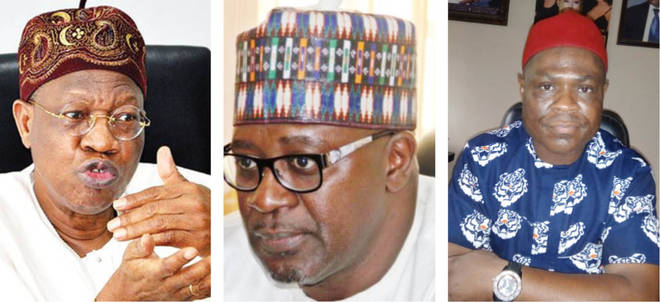Concerns over hate speech as 2019 elections approach
With less than one year to the 2019 elections, Nigerian media space is heating up as hate speeches among politicians and their supporters is taking a skyward move. As the 2019 elections approach, politicians and their supporters are filling the media space with hate speech to paint their opponents negatively and promote their own stand. […]


With less than one year to the 2019 elections, Nigerian media space is heating up as hate speeches among politicians and their supporters is taking a skyward move.
As the 2019 elections approach, politicians and their supporters are filling the media space with hate speech to paint their opponents negatively and promote their own stand.
Just like in the run-up to the 2015 elections when hate speechy nearly tore the country apart, there is a gradual increase in the level of abuse and tantrum in the media.
Though the National Broadcasting Commission (NBC) has said it was stepping up efforts towards ensuring decent broadcasting and fair-play in the months before the voting period, politicians and their supporters are not relenting in their tirades.
Verbal and non-verbal communication symbols are already being deployed to promote self-interest and to denigrate opponents. Politicians and their agents are using unethical content in the media and online platforms to bring down their opponents.
The NBC Director-General, Malam Is’haq Moddibo Kawu, said the spate of inciting political broadcasts which were heating up the polity and breaching the Nigeria Broadcasting Code forced the commission to increase its vigilance.
Kawu said the NBC had been convening stakeholders meetings with stations operators and political parties’ representatives across the country to stop hate speech and other indecent broadcast.
While advising radio and television stations as well as politicians to live up to expectations, Malam Kawu said, “We are living in democratic times or more appropriately, in a period of democracy consolidation in our country. By its nature, democracy presupposes the vigorous contestation of ideas, by political parties as well as by politicians.”
Quoting the Broadcast Code, Kawu said no broadcast shall encourage or incite to crime, lead to public disorder, be repugnant to public feeling or contain an offensive reference to any person, alive or dead, or generally, be disrespectful to human dignity.
The Director-General, however, said in Kano, the NBC is faced with very serious challenges in terms of the refusal of broadcasters to do the right thing.
That was why during the last anniversary Lecture of the NBC, the Sultan of Sokoto, Alhaji Sa’ad Abubakar III, while condemning the very disturbing trend of hate speech in Nigeria, requested the NBC to wake up to its responsibility and sanction defaulting stations.
Already, 23 radio and television stations that were found guilty of hate speech have been fined by the NBC. The stations got the big stick for also spreading indecent musicals and making unverifiable claims.
The NBC’s spokesperson Maimuna Jimada said the broadcasting stations were punished in contravention of the provisions of the Nigeria Broadcasting Code.
She said broadcasters had a duty to promote the socio-economic well-being of the Nigerian state and abide, strictly by the provisions of the Code or face sanctions.
Besides, in February, the Nigerian Press Council (NPC) in collaboration with Word and Image Ltd, a firm of communication consultants organized a workshop on hate speech. At workshop titled “Hate Communication in Nigeria: Identifying Its Roots and Remedies,” it identified some causes of the phenomenon in Nigeria. They include issues of nepotism and ethnicity, lack of national political leadership, feelings of alienation by the people and the struggle for recognition and disrespect of the rule of law and biased judicial system, among others.
It also recommended that ministries of information and culture, at all levels, should set up social media units to provide global perspectives and wider mileage for public information dissemination; government to hold periodic conferences to positively engage the public especially the youths; government should also use social media platforms for community organizing and by so doing popularize civic participation and engagement and; media professionals should continue to adhere to ethical and professional codes of practice and engage in investigative journalism.
Besides, it is not only the NBC, the Sultan and NPC that are concerned with hate speech. A media expert, Mr Olayemi Daniyan, cautioned media practitioners against partisanship as the 2019 elections inch closer. He said allowing politicians and their supporters to vent hate speech in the media is capable of derailing the country’s democratic process.
Mr Daniyan, who works with Radio Nigeria, said the NBC called for stiffer sanctions against deterrent stations.
Also, the Chairman, Oyo State League of Veteran Journalists (LVJ), Alhaji Wale Adele urged media proprietors and practitioners to desist from any dealings that can destroy the image of the profession as 2019 general elections are fast approaching.
He told Daily Trust on Sunday in Ibadan, that the forthcoming election is an opportunity for reporters to demonstrate their competency and loyalty to Nigerians.
Adele identified the influence of media owners and competency of practioners as factors militating against efficiency of journalism in the country.
He lamented that many of the practitioners are not well trained, which he described as unfortunate.
“It is unfortunate that many of our younger colleagues are not well trained,” he said.
Also, the chairman, Nigerian Union of Journalists (NUJ), Imo State Council, Innocent Igwe, observed that the media cannot make hate speech on its own, but report, amplify or disseminate hate speech made by certain persons or politically exposed individuals.
Igwe noted that in the process of reporting, the media is blamed for perpetuating, encouraging or promoting hate speeches.
The NUJ chairman also pointed out that in recent times the social media seem to be the platform where a lot of unethical things happen, noting that there is “no control, no regulation and it’s an all comers affair.”
